Abara Erim and Sunday Oko (Lead Writers)
“I consumed large amounts of garlic or sometimes ingested excessive vitamins to prevent infection. Others also resorted to drinking substances like ‘agbo’ to prevent Coronavirus.”
Smith Jow** during the peak of COVID-19 pandemic
“The HPV Vaccine causes infertility, and it is a plan by the West to reduce the population of Africa especially Nigerians, so, I will not allow my daughter to take it.”
Joy Thomas** — reacting to the introduction of the HPV vaccine to Nigeria’s Routine Immunisation Schedule.
As of January 2024, more than 7 million COVID–19–related deaths have been recorded globally and a significant portion of these fatalities could have been easily prevented. Unfortunately, the spread of health misinformation played a detrimental role in undermining preventive measures put in place by public health agencies which resulted in most of these deaths. False claims, conspiracy theories, and stigma were identified as major contributors to these unnecessary deaths and hesitancies.Health
Fighting a pandemic of misinformation
In response to the infodemic during the COVID-19 outbreak, Nigeria Health Watch launched the Health Misinformation Management Project in 2020 in partnership with Meedan, a technology not-for-profit organisation and in collaboration with the Nigeria Centre for Disease Control and Prevention (NCDC).

By 2022, a total of 25 participants drawn from leaders of health educators, Ward Head Development Committees (WHDC), and healthcare workers were selected and trained with the mandate to cascade the training at their various levels of influence. The participating Local Government Areas (LGAs) including Chanchaga, Wushishi, Paiko, Kontagora, Gbako, Magama, Shiroro and Mashegu were selected from each senatorial zone.
What’s Working
-
Rayuwa Da Korona: How two local radio stations are responding to COVID-19 in Kano State
Arewa Radio and Freedom Radio, two stations with large audiences in Kano State, actively combat misinformation and false rumors about the coronavirus. The stations run programming that builds trust and confidence between the public and health officials. They engage local religious leaders, who are very influential in the area, provide forums for listeners to ask questions of experts, and air programming in local languages with titles such as “Demystifying COVID-19” and “Eradicating COVID-19.” Although they try to make programming widely accessible, some want content available online and in infographic form. Read more
Fifty facility-based staff were trained on health misinformation following the cascade and about 500 community members across the 8 LGAs benefitted from the training. Nigeria Health Watch also provided information, Education and Communication (IEC) materials during the training. At the same time, over two hundred and fifty thousand (250,000) mentions were identified from social listening, of which 42 (0.17%) were identified as potential misinformation across various social media platforms.
Outputs from this phase included the production of five (5) evidenced-based debunks into easy-to-understand formats that included infographics and other media dissemination strategies across various social media channels and targeted audiences.
Building a health misinformation management army
The Nigeria Health Watch misinformation management project is currently in its 4th year of implementation. In 2023, while reflecting on the outputs from the community listening, it became necessary to conduct a needs assessment in Niger State, targeted at understanding statewide gaps in the health misinformation ecosystem. Findings from the assessment heralded the launch of the first-ever Health Misinformation Management Fellowship.
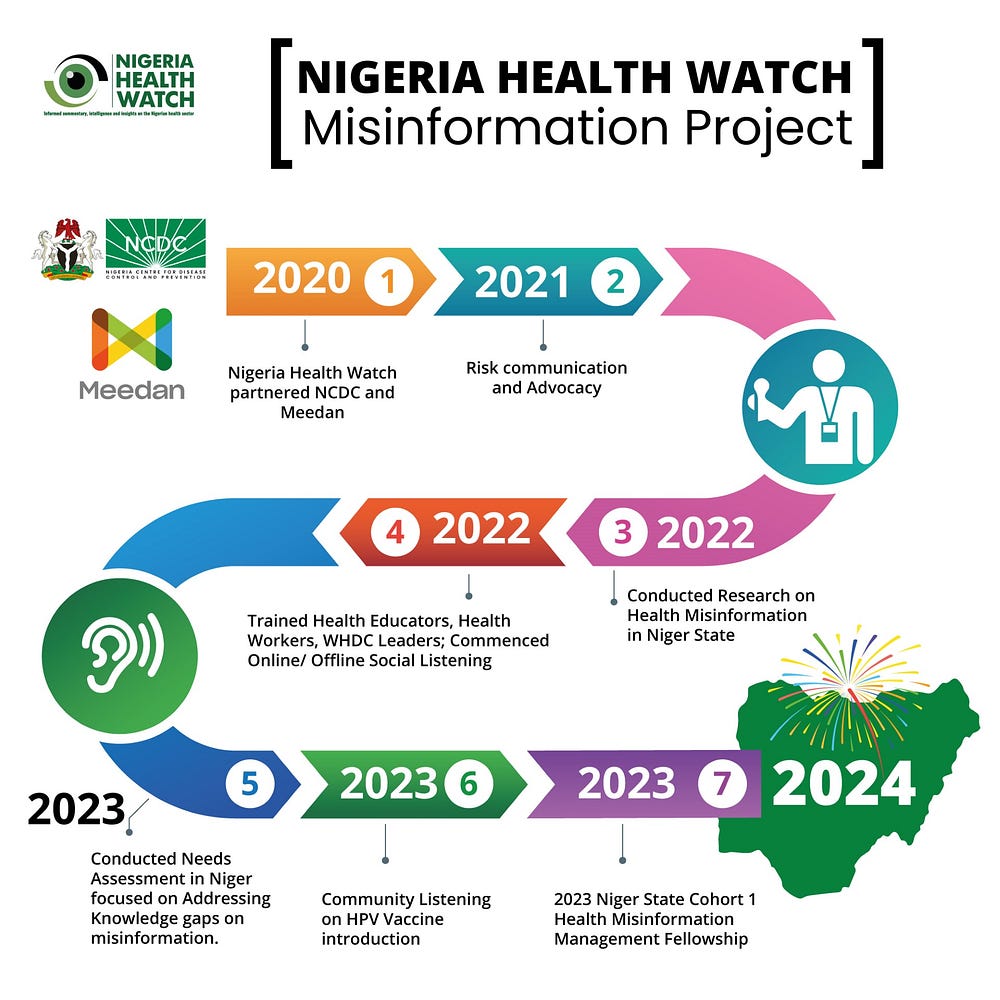
The fellowship cohort comprised 25 participants including the Federation of Muslim Women’s Associations in Nigeria (FOMWAN), Christian Association of Nigeria (CAN), Ward Development Committees (WDC), Youths, Market Women Group, Emirate Council, Traditional Leader, Media, Women’s Wing of the Christian Association of Nigeria (WOWICAN), Deaf Association (Disability group), Jama’atu Nasril Islam (JNI), and other relevant stakeholders in the state.
For over 12 weeks, the fellows engaged in a multitude of activities aimed at combating health misinformation in the state through community engagement activities, social media activities, advocacy to schools and health care centres, outreach, radio, and TV appearances, as well as distribution of information education communication (IEC) materials in local languages.
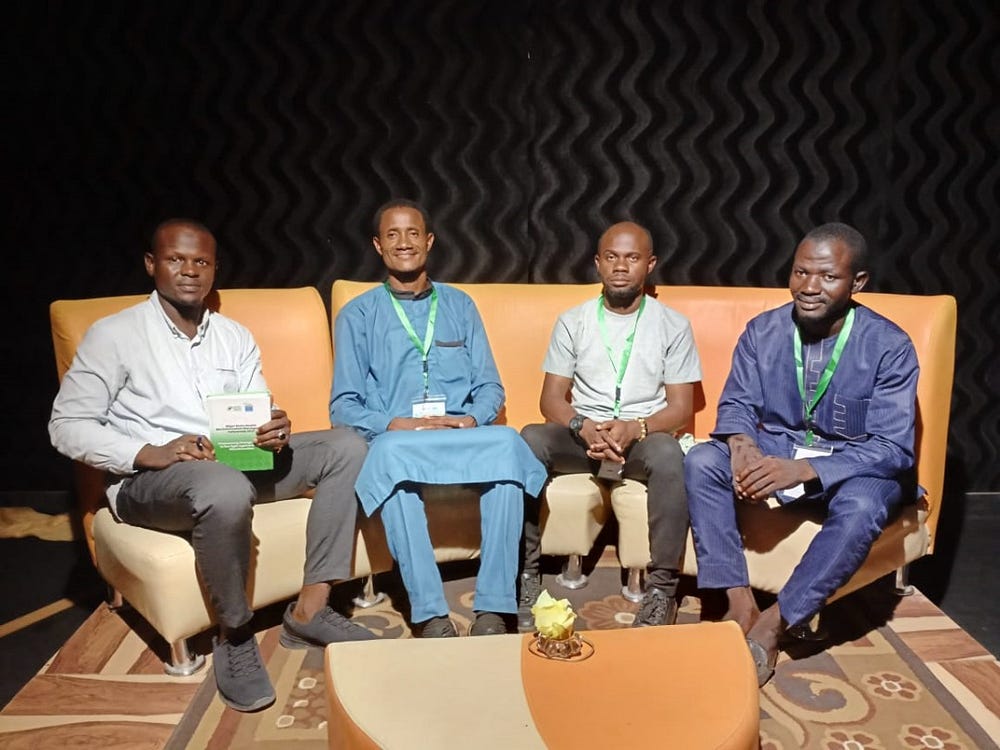
Maryam Musa, a student at Government Girls Day Secondary School Minna, shared how the fellows’ advocacy enlightened her about the dangers of cervical cancer and the importance of HPV vaccination. “I have been enlightened about the dangers of cervical cancer and the need to get the HPV vaccine. I have also informed my parents and siblings on the harmful effects of spreading misinformation”. Maryam said.
The Fellows identified health misinformation and disseminated accurate information while debunking myths in their various host communities. Part of the project was ensuring that everyone was reached with accurate information. Bilkisu Saleh was the only Person with Disability (Deaf) among the participants. She shared that “during the field assignment, I realised that health misinformation spread with high speed even within Persons with Disability (PWD) communities because of social media influence, family, and friends, but I believe that with our intervention/ awareness, they are well enlightened”
.

The fellows reached over 18,000 people offline and over 20,000 people online through Facebook, X (Twitter) and WhatsApp via user-generated content. However, they did not only target community residents alone, part of their advocacy was also focused on journalists and media organisations in the communities. Falalu Suleiman, a journalist at the Nigerian Union of Journalists, emphasised the impact of the fellows during one of the fellows’ visits. He went on to stress the vital importance of verifying information before dissemination.
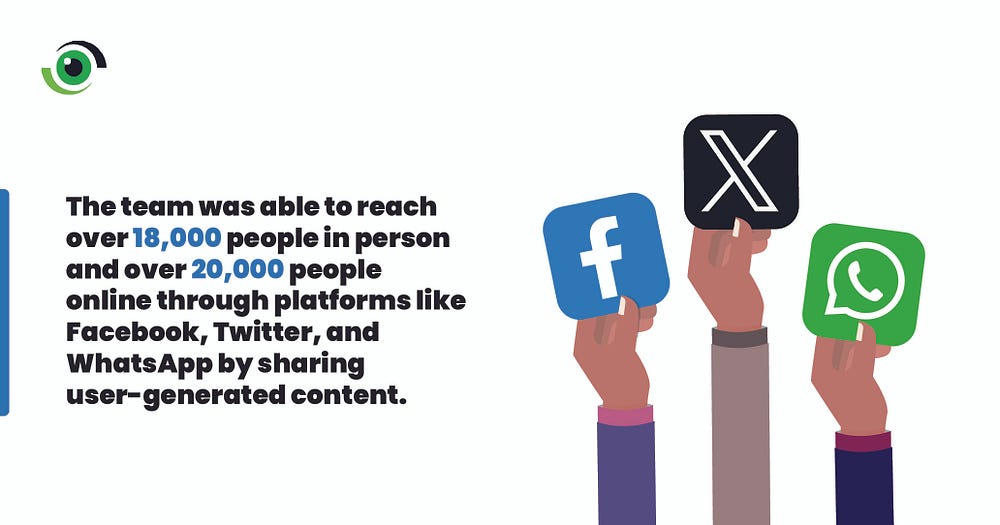
On January 30th 2024 the project graduated the first cohort of fellows, following an impactful 12 weeks of capacity building and advocacy woven into the fellowship curriculum. Dr Bello Tukur, the Niger State Commissioner for Secondary and Tertiary Health, while emphasising the significance of the fellowship programme in the state, highlighted its crucial role in combating health misinformation. “Misinformation can cause more severe damage than the lack of information especially during disease outbreaks, People were made to bathe and drink salt water during Ebola crises, and this led to the death of hypertensive persons. This fellowship programme is a step in the right direction as it will help us overcome this menace in our communities”. Dr Tukur said.
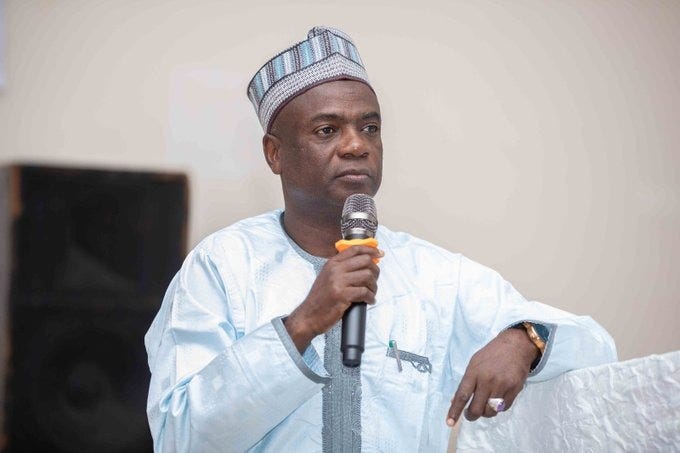
A continuous battle
According to the World Health Organisation (WHO), misinterpretations of health information tend to rise during outbreaks and disasters, impacting health behaviours negatively. It is evident that the health misinformation management project achieved a tangible impact, however, managing a vast amount of health information and misinformation can be overwhelming. Sorting through this sea of data effectively requires significant resources in terms of funding, manpower, and technology.
Misinformation often travels like wildfire, and this necessitates constant vigilance as well as tailoring misinformation management strategies to fit the diverse Nigerian population. Relying on a one-size-fits-all approach for misinformation management falls short especially when dealing with intricate challenges, particularly within diverse healthcare systems. To address this, dedicated efforts should focus on evidence generation through comprehensive assessments similar to the one conducted in Niger State. These assessments will help uncover the distinct characteristics and intricacies of each specific context.
Nigeria Health Watch through the Misinformation Management project is committed to addressing the challenge of health misinformation through collaborations and expansion to other states in the country. The battle against health misinformation is sometimes more difficult than the fight against the disease itself, it can lengthen outbreaks and build distrust, however, together we can stop the spread of health mis and disinformation.
**not their real names


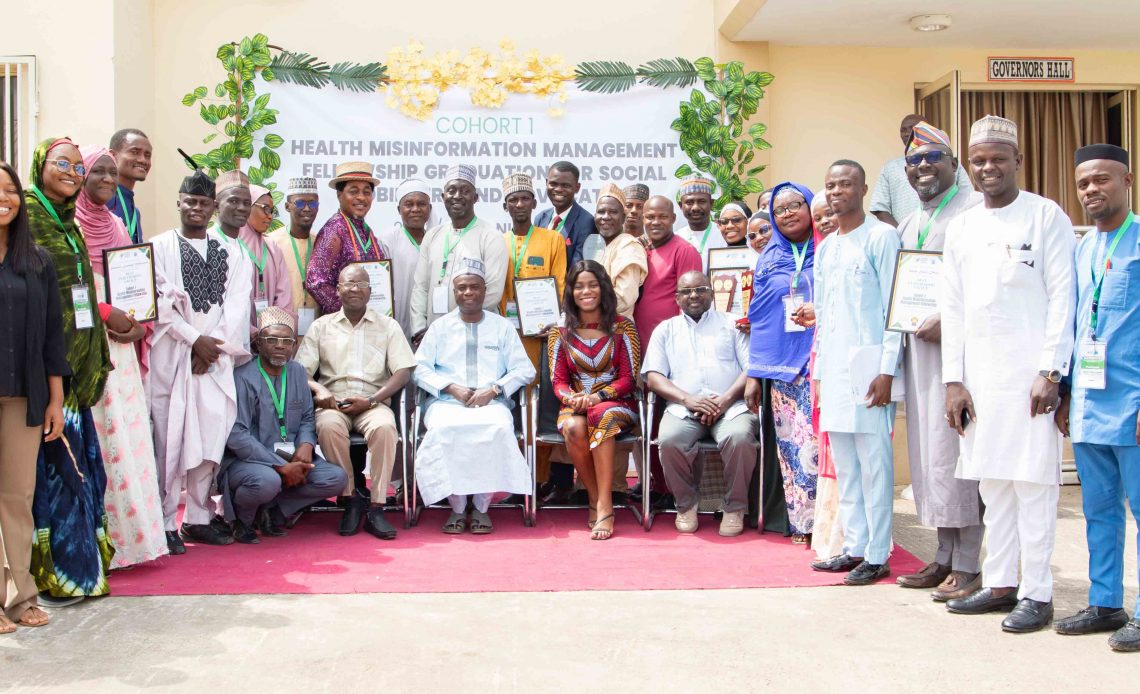
I think the creation of this community and effortsade so far will really douse unnecessary fears and mitigate future misinformation as well as wrong mindset amongst our citizenry. God bless the initiator. KUDOS!. However it should be extended to other zones of the country. Thanks